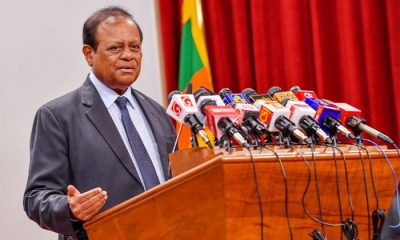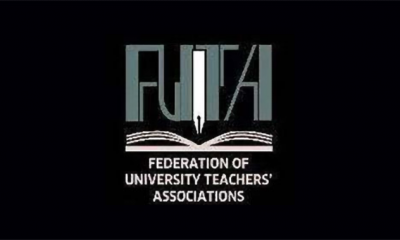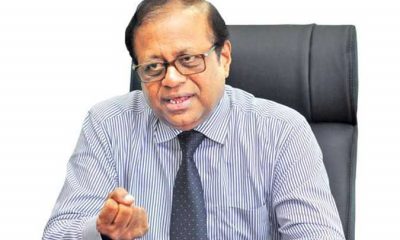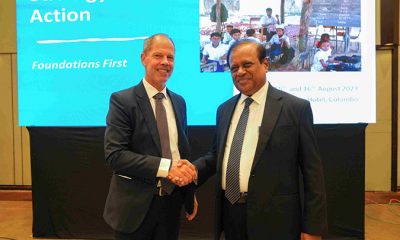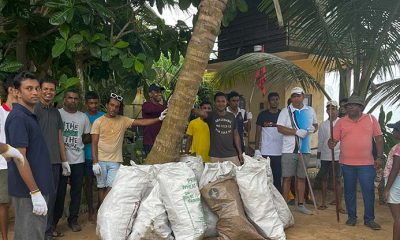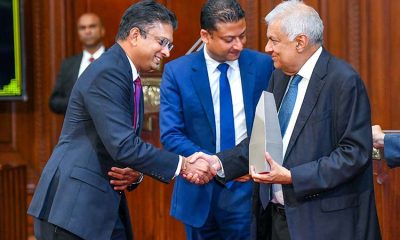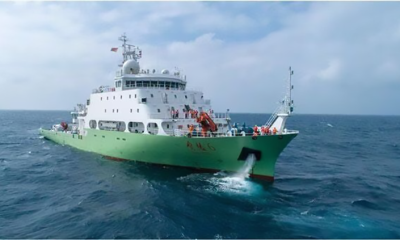Editorial
Brain exodus and band-aid remedy

Monday 7th August, 2023
Minister of Education Susil Premajayantha has said the government will take action to fill the vacancies created by the unprecedented migration of university dons. Circumstances may have left it with no alternative but to do so in a bid to mitigate the ever-worsening crisis in the higher education sector with so many teachers voting with their feet. But the proposed course of action will end up being an exercise in futility in the long run unless the factors that drive university teachers to leave the country are eliminated.
University teachers are among the frustrated professionals who are leaving the country in droves mostly due to economic difficulties and uncertainty about their future. Not that everyone who opts for foreign employment achieves a higher station of life overseas, but despondency blinds people to reality and drives brain exodus. The government has to address these issues urgently if it is to make any headway in its efforts to resolve the university crisis once and for all.
It is being argued in some quarters that unprecedented income tax increases have affected only a small section of the workforce. But the fact remains that the aggrieved ones are highly specialised professionals who are not easy to replace, as evident from the crisis in the health sector owing to the exodus of medical specialists. They are paid relatively high salaries for a reason. Among them are IT professionals who help boost the country’s foreign exchange inflow by teleworking for foreign companies from here. The so-called KPO (Knowledge Process Outsourcing) has become the order of the day in the modern world. It is prevalent in industries where intellectual capital and technical expertise play a crucial role in driving business success; they include the IT industry, where companies leverage the skills and knowledge of specialised professionals scattered across the world to enhance their operational efficiency and reduce costs. A large number of Sri Lankan IT professionals have already left the country.
Brain export, which has become a fact of life for many developing countries, could yield positive results, if properly handled. But human capital flight, if allowed to spin out of control, could prove disastrous as it entraps nations in a vicious cycle; excessive brain drain diminishes a country’s capacity to attain development, and that exacerbates skill migration and brings about impoverishment, which causes brain exodus. This has been Sri Lanka’s predicament, especially since the beginning of the current economic crisis, which shows no signs of going away anytime soon.
The government may be able to recruit university teachers in a hurry, as planned. There will be thousands of applicants because the country is full of job seekers, but the question is whether those who are to be recruited will be the right ones for the jobs on offer in universities, which were facing a dearth of experienced teachers even before the onset of the current crisis. How bad the situation at present is not difficult to see. On the other hand, what guarantee is there that the university teachers to be recruited in a hurry will not leave the country if opportunities present themselves?
Before trying to resolve the university crisis, the government ought to grasp the sheer scale thereof. Understanding a problem properly is half the battle in solving it. The current administration seems to think that anyone could teach at a university. Maybe it does not hold university teachers in high esteem because many of them demean themselves by stooping so low as to strike Faustian bargains with the ruling party politicians with deep pockets and shallow minds. Some of them have even taken to active politics and cut pathetic figures in Parliament.
The government must have talks with the Federation of University Teachers’ Associations on the problems affecting the university system and make a serious effort to sort them out.
Editorial
Beggars at crossways

Thursday 2nd May, 2024
The police have embarked on a campaign, parallel to their war on drugs, to clear busy intersections of beggars who solicit alms near traffic lights, causing much inconvenience to motorists. Scores of beggars have already been arrested and hauled up before courts for doing so, we are told.
Sri Lankans drive and ride like bats out of hell, and champ at the bit at intersections to zing. Amber, for them, means ‘go’. So, the beggars at traffic lights not only become a nuisance to motorists but also run the risk of ending up as mere statistics in road fatality records. Police action to stop begging at crossways has therefore met with public approval, according to media reports.
In a bid to justify their operation against mendicants, the police have said most beggars collect thousands of rupees a day and therefore turn down offers of wage labour when they are rounded up. True, there are some beggars’ rings and their members collect a lot of money daily, but the same cannot be said about all panhandlers. More than 50 percent of people in the city of Colombo live in slums and shanties, according to researchers. Their lot has not improved in spite of urban yuppification projects and much-advertised densification schemes. The current economic crisis has made their lives even more miserable, and some of them have been left with no alternative but to beg.
The World Bank (WB) has said that ‘poverty rates continued to rise for the fourth year in a row, with an estimated 25.9% of Sri Lankans living below the poverty line in 2023.’ It has also pointed out that ‘labour force participation has also seen a decline, particularly among women and in urban areas, exacerbated by the closure of micro, small, and medium-sized enterprises. Households are grappling with multiple pressures from high prices, income losses, and under employment’. So, the government must make a serious effort to help the indigent families crying out for help.
One wonders why beggars in public places should be singled out for legal action in a country which itself is notorious for begging. A minister of the incumbent regime, which pauperised the country, once posed for a picture, with cupped hands, receiving as he did a fistful of rice symbolically from a foreign envoy whose government donated a consignment of food items. The MPs are begging for duty-free vehicle permits with a view to selling them. Former Minister Mahindananda Aluthgamage has won a money laundering case filed against him during the Yahapalana government over the acquisition of a house in a prime residential area in the city of Colombo. It is said that he revealed how he had raised funds to acquire that property. Going by his explanation, an MP can buy a house in the Colombo municipal area with the proceeds from the sale of his or her duty-free vehicle permit plus a one-million-rupee loan! No wonder the MPs are so desperate for duty-free vehicle permits. Some of them are begging for liquor permits as well.
Meanwhile, the police, who are all out to arrest beggars for obstructing traffic, ought to have the same high-octane performance in respect of others who have become a bigger nuisance to road users. Hawkers have encroached on pavements in Colombo as well as other cities, forcing pedestrians to walk on the road, risking life and limb. Bicycle and cart races are being held in many parts of the country, these days, and their organisers, riding motorcycles and waving flags menacingly, under the influence of liquor, terrorise regular road users, with the police looking the other way. The traffic police disappears from roads at the first signs of rain and remain dry while cities are wet and chaotic. Much more needs to be done than removing beggars from intersections to bring order out of chaos on roads.
Editorial
Where are workers?

Wednesday 1st May, 2024
Another International Workers’ Day has dawned. Grand preparations have been made in this country to celebrate it amidst an unprecedented economic crisis. These celebrations, however, have little or nothing to do with workers; they have apparently everything to do with political parties and their leaders. The next presidential election is only a few months away, and therefore we will see a lot of political muscle flexing today, with the prospective candidates bringing as many supporters as possible to Colombo from all parts of the country to attract media attention.
Given the despicable manner in which Sri Lankan politicians use workers to gain political mileage on the pretext of championing the rights of the working class, one wonders whether Sri Lanka should have a separate workers’ day on 21 March, when the World Puppetry Day falls. We hold workers in high esteem and intend no affront to them, but it needs to be said that the spectacle we behold on 01 May, year in year out, is a grand puppet show. Worryingly, workers do not care to assert themselves at least on May Day, much less eclipse politicians. They are not ashamed of making a public display of their servility to their political masters.
All political parties that stand accused of having suppressed labour rights have trade union wings, which have workers on a string. The UNP ruthlessly crushed a general strike in 1980. It resorted to mass sackings, and about 50,000 strikers were terminated overnight for demanding a pay hike. Dozens of those unfortunate men and women took their own lives. It is also celebrating the International Labour Day, with its trade unionists carrying its leaders on the shoulders and singing hosannas. The SLPP, whose leaders have the blood of workers on their hands and bankrupted the economy, causing many job losses, and reducing millions of people to penury, is also celebrating the International Workers’ Day! The same goes for the SLFP, which left the 1980 strikers in the lurch after they lost their jobs, and became part of the incumbent dispensation. The JVP, which murdered many trade union leaders and workers for opposing its terror campaign in the late 1980s, now claims to be the greatest protector of workers’ rights. It unflinchingly betrayed workers in 1980 by pulling out of that year’s general strike at the eleventh hour; in doing so, it demoralised the protesting workers beyond measure and emboldened the J. R. Jayewardene government to crush the strike. It is also celebrating the International Workers’ Day today. Time was when the traditional left was at the forefront of struggles to win workers’ rights, but unfortunately it has been in the SLFP-led governments responsible for gross violations of labour rights.
It may not be fair to say workers have not gained anything, at all, under successive governments. There are some progressive labour laws and workers’ welfare schemes. But workers would not have been in the current predicament if those governments had worked with their interests at heart. Workers are struggling for survival because all governments since 1977 have aggravated the country’s debt burden, which led to the current crisis precipitated by the Gotabaya Rajapaksa government.
Trade unions in Sri Lanka have earned notoriety for overstepping their limits, and some of their leaders have strayed into active politics at the expense of their members’ interests. Several trade unions were among those who misled President Gotabaya Rajapaksa and contributed to the ruination of the economy. It was at their behest that he plunged head first into a disastrous experiment with organic farming.
It is time Sri Lankan workers, especially their trade union leaders, abandoned the practice of helping further the interests of politicians on May Day, and realised the need to liberate themselves from the clutches of political parties. Let that be their May Day resolution.
Editorial
JVP in NPP’s clothing

Tuesday 30th April, 2024
The JVP-led NPP has come under an avalanche of criticism for a claim made by Nalin Hewage, one of its stalwarts, in a recent television debate, that the victims of the JVP’s reign of terror in the late 1980s were anti-social elements such as rapists, robbers, bootleggers and cattle rustlers. A protest was held near the JVP headquarters, Battaramulla, yesterday, against that controversial claim.
Hewage’s assertion runs counter to JVP/NPP leader Anura Kumara Dissanayake’s recent statement, in Canada, to the effect that he was sorry for the JVP’s violence in the late 1980s. One wonders whether the JVP is remorseful for its terrorism (1987-89) or divided on that score, with the party’s ultra-radical core remaining unremorseful. Is the JVP in the NPP alliance trapped in what may be called the Dr. Jekyll and Mr. Hyde duality? Other political parties planning to contest the upcoming presidential election are out for the JVP’s blood, so to speak, the prominent among being the SJB, the UNP and the SLPP.
The UNP has condemned the JVP for the latter’s mindless violence in the late 1980s. It seems to think the people have forgotten its own Caravan of Death, which left thousands of youth dead. It ran many torture chambers, massacred suspects and buried them in mass graves or burnt them on tyre-pyres on the roadside by way of a warning to others. Most of all, the country would not have been plunged into a bloodbath if the UNP had not falsely accused the JVP of complicity in the 1983 anti-Tamil pogrom and proscribed it. Perhaps, the UNP destroyed more lives than the JVP did during the 1987-89 period. Worse, the UNP, had no qualms about enlisting the JVP’s support to retain its hold on Parliament after falling out with President Maithripala Sirisena in 2018. The ‘Marxist’ JVP unashamedly propped up the beleaguered ‘capitalist’ UNP administration! The SJB leaders were in the UNP government, which benefited from the JVP’s backing. They did not make an issue of the JVP’s ugly past then.
The SLPP is also without a moral right to condemn the JVP for its past violence. Its leader Mahinda Rajapaksa would not have won the 2005 presidential election but for the JVP’s support. It was the JVP which led his propaganda campaign to all intents and purposes and made his victory possible.
The JVP is playing the victim card to gain public sympathy. It says it has become a target of the political elites in the SLPP, the UNP, the SJB, the SLFP, etc., They, it says, have banded together, shedding their differences, to suppress it. This claim is not without a modicum of truth. The leaders of the political parties opposed to the JVP co-operate to safeguard their interests, and that is why none of their leaders have been incarcerated for their crimes despite regime changes. But one disagrees with the JVP on the Marxist markers used in identifying elites. Going along with Vilfredo Pareto’s theory of elites instead, one may argue that the JVP leaders cannot be excluded from the political elites. Examining the structure and change of elites, Pareto has convincingly argued that elites and non-elites are not stable and new elites rise and oust othe old ones, and this change is called the circulation of elites, which has not spared the JVP. Besides, the JVP has earned notoriety for political promiscuity. It has honeymooned with the parties it describes as elitist. In 1970, it backed the SLFP-led United Front, and turned against the newly-formed government the following year. In the late 1970s, it got close to the UNP, whose government released its leaders from prison. Later, it turned on the UNP and met its Waterloo in 1989. In 1994, it backed the SLFP led by Chandrika Bandaranaike Kumaratunga, and subsequently fell out with it. In 2004, it coalesced with the SLFP and had representation in the UPFA Cabinet. The following year it enabled Mahinda to realise his presidential dream. It took on Mahinda later on. In 2015, it honeymooned with the UNP again for about five years. Now, it is on a campaign to vilify the UNP and its leader Ranil Wickremesinghe.
Fear being expressed in some quarters that the JVP is likely to revert to its old ways and suppress political dissent ruthlessly the way it does in universities is not unfounded. Its role in the 2022 protests, especially the abortive march on Parliament, has fuelled the fear that it has not bid farewell to extra-parliamentary methods to capture state power.
The JVP would have the public believe that winning the next presidential election will be a walk in the park for it, but reality is otherwise. It has its work cut out to allay fears in the minds of the public. Having made a colossal blunder at the last presidential election, the people are not likely to vote blindly for any political party or person again. The least the JVP can do to gain public confidence is to tender an unqualified apology for its past crimes and publicly abandon its outdated ideology.
-

 Business6 days ago
Business6 days agoSri Lanka Resorts of Cinnamon Hotels & Resorts mark Earth Day with impactful eco-initiatives
-

 Business7 days ago
Business7 days agoDialog Axiata recognised as the Most Significant FDI Contributor by BOI
-

 Business7 days ago
Business7 days agoUNESCAP Technical Cooperation Highlights Report flags significant strides in its partnership with Sri Lanka
-

 Business2 days ago
Business2 days agoINSEE Ecocycle marks 21 years of environmental excellence with a city cleaning program in Anuradhapura
-

 News5 days ago
News5 days agoGerman research ship allowed Sri Lanka port call after Chinese-protest led clarification
-

 News5 days ago
News5 days agoSri Lankan Oil and Gas exploration grinds to a standstill amid protracted legal battle
-

 Editorial7 days ago
Editorial7 days agoShocks from Bills
-

 Features3 days ago
Features3 days agoCalling applications for MBBS!


